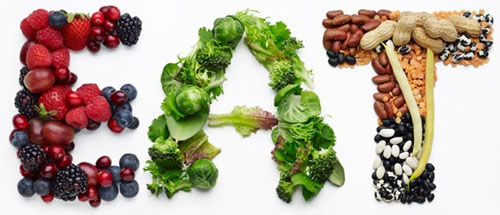As promised in my last post, I’m going to cover 17 characteristics of a great diet according to Dr. Michael Greger in his latest book, How Not to Diet: The Groundbreaking Science of Healthy, Permanent Weight Loss.
Anti-Inflammatory: Inflammation is our immune system’s response to unhealthy elements that invade our bodies. Processed foods and animal products are pro-inflammatory; whole plant foods, fiber, and phytonutrients are anti-inflammatory. Anti-inflammatory superstars include turmeric, ginger, raw garlic, green or black tea, and fiber.
Clean: Research connects chemical pollutants with obesity. The meat, poultry, and seafood industries have been plagued by obesogenic pollutants. Harmful substances can be present in canned goods and certain plastic containers. Pesticides also affect the obesity rate. The solution? Go organic, get to know the people who make your food, and learn to cook from scratch.
High in Fiber-Rich Foods: High fiber diets make us feel full by distending our bellies and delaying emptying into the intestines. Upon reaching the intestine, they block absorption of carbs and fats into the bloodstream and help curb our appetites. And, to top it off, the good bacteria in our gut biome love to feast on fiber!
High in Water-Rich Foods: Water adds bulk to what we eat without adding calories. Water-rich foods take more chewing action and have a dampening effect on stomach emptying. These built-in delays provide much needed time for our body to signal to our brain that we should stop eating!
Low Glycemic Load: These foods avoid sugar spikes in our bloodstream and the associated activation of the reward/craving centers in our brains. They help us burn more fat and result in less of a metabolic slowdown as we lose weight.
Low in Added Fat: Naturally low-fat foods encourage a higher burn rate in resting calories, and a higher percentage of their intake gets flushed down the toilet. Don’t be fooled by processed foods claiming “low fat” as they frequently contain extra sugar!
Low in Added Sugar: Sugar amps up our caloric intake, triggers an addictive response, and delivers no material nutritional value. What’s the number one strategy to avoid added sugar? Stop eating processed foods!
Low in Addictive Foods: The combination of sugar, fat, and salt revs up our craving engines and compels us to overeat nutritionally vacuous foods. Better to train our brains to enjoy healthy foods.
Low in Calorie Density: We’re designed to eat about 4-5 pounds of food per day. The body principally registers satiety by volume, not calories. So, it may be that obese individuals eat the same relative weight of food but simply ingest substantially more calories per mouthful.
Low in Meat: According to Dr. Greger, the odds of being obese increase by 18% for each 1% intake of calories by meat. This weight gain tends to settle in the abdomen.
Low in Refined Grains: Ultraprocessed food account for 58% of our daily intake. These refined grains contribute to weight gain far more than any other dietary and lifestyle factors. By contrast, whole grains increase satiety, increase our metabolic rate, and increase caloric loss via stool.
Low in Salt: Like sugar and fat, salt has an addictive quality that stimulates appetite and may encourage ingestion of sugary drinks.
Low Insulin Load: Sugar and meat protein cause insulin surges which, over time, result in cellular insulin resistance. High fat meals also diminish insulin sensitivity.
Microbiome Friendly: Our microbiome regulates our immune system, balances hormones, improves digestion, and makes life-sustaining vitamins. Every food choice affects our gut flora. A diverse gut flora supports lower body fat. Eat fiber-rich food (the real stuff, not fiber supplements).
Rich in Fruits and Vegetables: Such diets yield 17% lower odds of weight gain or abdominal obesity. Plant cells also affect gene expression in a way that promotes weight loss.
Rich in Legumes: The more beans you eat, the lower your body weight, waist size, saturated fat, and cholesterol intake. Beans also slow digestion and delay the return of hunger. And beans are packed with protein and fiber.
Satiating: We are built for gluttony. Our survival mechanisms were fine-tuned through thousands of years of scarcity. To keep our brains and hormones appropriately regulated, opt for fiber-rich, water-rich whole foods that suppress appetite. Make sure there’s ample variety in food selection to keep the mind and body happy.
